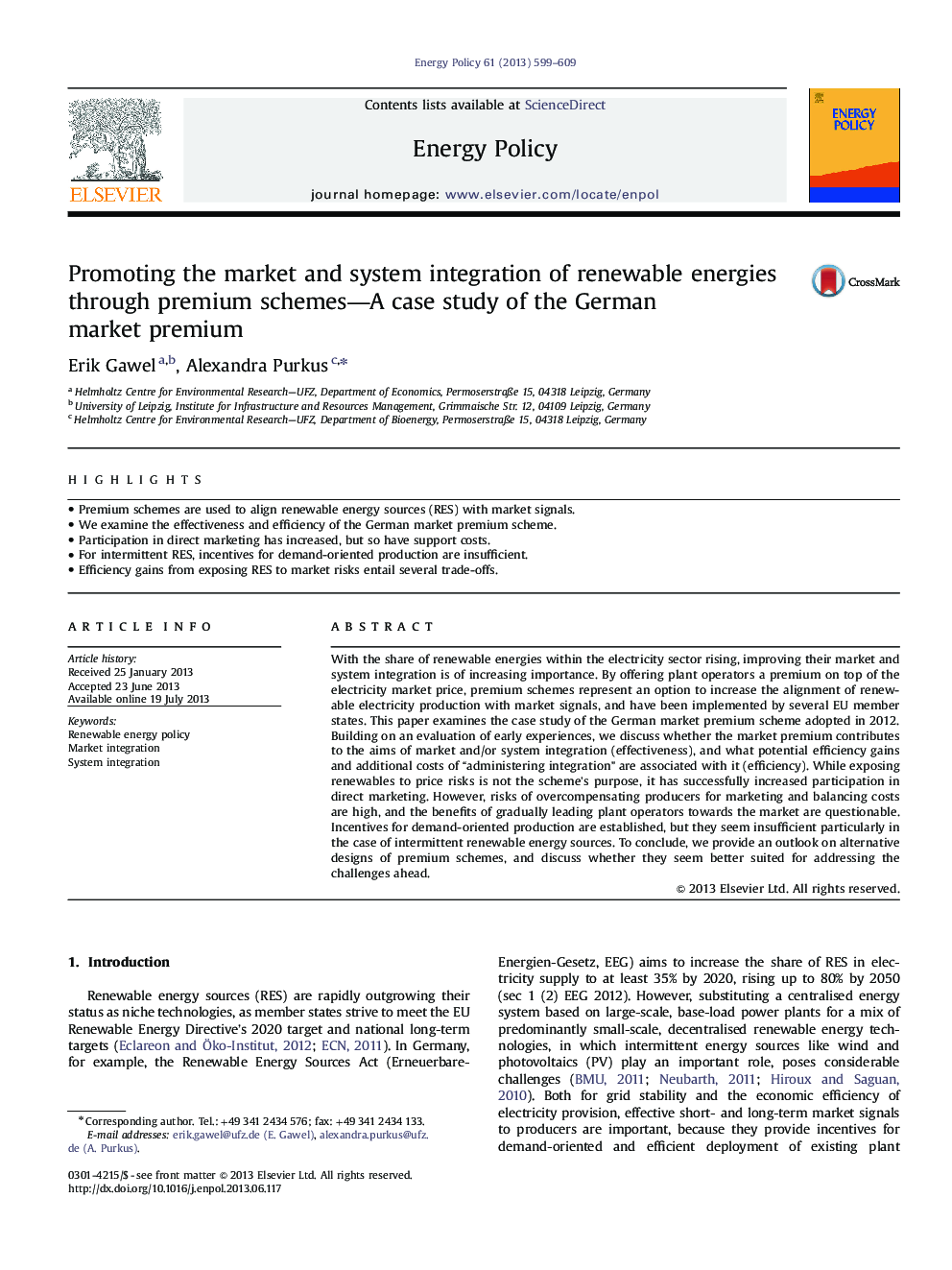| کد مقاله | کد نشریه | سال انتشار | مقاله انگلیسی | نسخه تمام متن |
|---|---|---|---|---|
| 7404629 | 1481297 | 2013 | 11 صفحه PDF | دانلود رایگان |
عنوان انگلیسی مقاله ISI
Promoting the market and system integration of renewable energies through premium schemes-A case study of the German market premium
ترجمه فارسی عنوان
ترویج بازار و سیستم یکپارچه سازی انرژی های تجدید پذیر از طریق طرح های حق بیمه - مطالعه موردی حق بیمه در بازار آلمان
دانلود مقاله + سفارش ترجمه
دانلود مقاله ISI انگلیسی
رایگان برای ایرانیان
کلمات کلیدی
سیاست انرژی تجدید پذیر، یکپارچه سازی بازار، ادغام سیستم،
ترجمه چکیده
با سهم انرژی های تجدید پذیر در بخش برق افزایش یافته است، بهبود بازار و سیستم یکپارچه سازی سیستم، اهمیت بیشتری را به دنبال دارد. با ارائه اپراتورهای کارخانه در مقیاس بالای قیمت بازار برق، طرح های حق بیمه، گزینه ای برای افزایش همبستگی تولید برق تجدید پذیر با سیگنال های بازار هستند و توسط چندین کشور عضو اتحادیه اروپا اجرا شده است. در این مقاله، مطالعه موردی طرح حق بیمه بازار بازار آلمان که در سال 2012 اتخاذ شده است مورد بررسی قرار می گیرد. بر اساس ارزیابی تجربیات اولیه، ما بحث می کنیم که آیا حق بیمه بازار به اهداف بازار و / یا یکپارچگی سیستم (اثربخشی) کمک می کند و چه میزان بهره وری بالقوه و هزینه های اضافی ادغام اداره با آن ارتباط دارد (کارایی). در حالی که استفاده از انرژیهای تجدید پذیر برای ریسک قیمت ها، اهداف این طرح نیست، این شرکت با موفقیت در مشارکت مستقیم در بازاریابی افزایش یافته است. با این حال، خطرات تولید کنندگان بیش از حد عوارض برای هزینه های بازاریابی و متعادل سازی بالا است، و مزایای استفاده کنندگان به تدریج پیشرونده های کارخانه را به سمت بازار سوق می دهد. انگیزه برای تولید تقاضای گرا ایجاد شده است، اما به نظر می رسد به خصوص در مورد منابع انرژی تجدید پذیر متناوب به نظر نمی رسد. برای نتیجه گیری، ما چشم انداز طرح های جایگزین طرح های حق بیمه را ارائه می دهیم و بحث خواهیم کرد که آیا آنها برای حل چالش های پیش رو مناسب تر هستند یا خیر.
موضوعات مرتبط
مهندسی و علوم پایه
مهندسی انرژی
مهندسی انرژی و فناوری های برق
چکیده انگلیسی
With the share of renewable energies within the electricity sector rising, improving their market and system integration is of increasing importance. By offering plant operators a premium on top of the electricity market price, premium schemes represent an option to increase the alignment of renewable electricity production with market signals, and have been implemented by several EU member states. This paper examines the case study of the German market premium scheme adopted in 2012. Building on an evaluation of early experiences, we discuss whether the market premium contributes to the aims of market and/or system integration (effectiveness), and what potential efficiency gains and additional costs of “administering integration” are associated with it (efficiency). While exposing renewables to price risks is not the scheme's purpose, it has successfully increased participation in direct marketing. However, risks of overcompensating producers for marketing and balancing costs are high, and the benefits of gradually leading plant operators towards the market are questionable. Incentives for demand-oriented production are established, but they seem insufficient particularly in the case of intermittent renewable energy sources. To conclude, we provide an outlook on alternative designs of premium schemes, and discuss whether they seem better suited for addressing the challenges ahead.
ناشر
Database: Elsevier - ScienceDirect (ساینس دایرکت)
Journal: Energy Policy - Volume 61, October 2013, Pages 599-609
Journal: Energy Policy - Volume 61, October 2013, Pages 599-609
نویسندگان
Erik Gawel, Alexandra Purkus,
